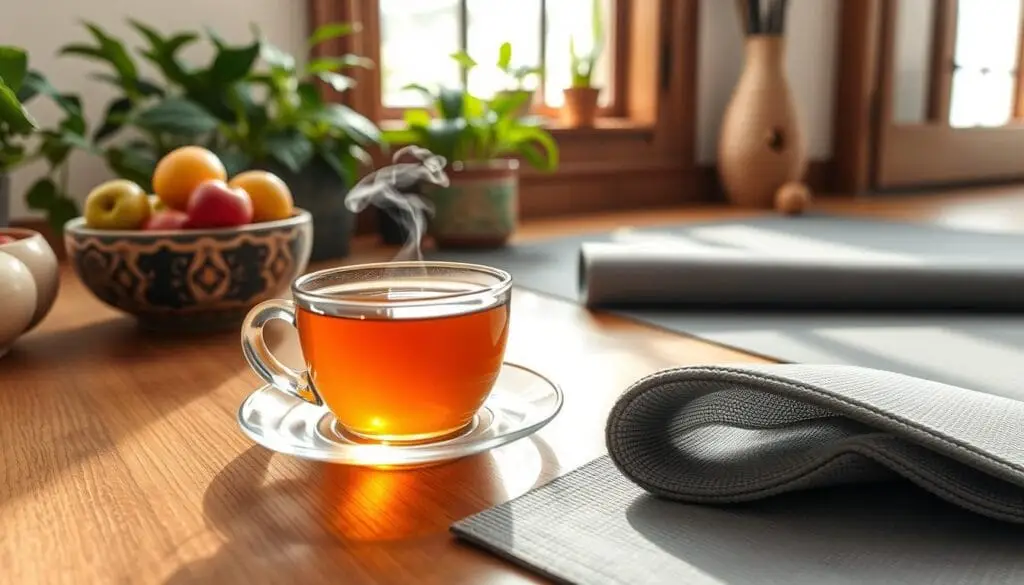Most adults need at least 7 hours of sleep every night. Yet, many struggle to make this a priority. To live a healthier, happier life, simple daily habits can make a big difference. This article will show you how to start your day right, exercise regularly, and eat mindfully.
Starting your journey of self-improvement can seem daunting. But, by taking small steps, you can build a strong foundation for a better life. Whether you want to be more productive, manage stress, or find joy in your day, this article has the answers.
Let’s explore the daily habits that can change your life. By focusing on self-care, discipline, and gratitude, you’ll be on your way to living your best life. You’ll unlock your full potential and enjoy every moment.
Smile and Spread Positivity
Smiling is a powerful habit that can uplift your mood and spread positivity to those around you. Research shows that smiling can release dopamine, a “feel-good” neurotransmitter that contributes to happiness. Even on days when you may not feel like it, make it a point to intentionally smile throughout the day.
The brain releases a cascade of chemicals, including endorphins, dopamine, and serotonin, when we smile. This promotes feelings of happiness, reduces stress, and alleviates pain. Smiling can also boost the immune system by releasing endorphins, helping the body fight off illness and recover more quickly.
When we smile, mirror neurons in the brain prompt us to mimic the expressions we see in others. This leads to a ripple effect of positivity. The relaxation response from smiling can also lead to a decrease in blood pressure, offering benefits for heart health.
“Smiling is an inexpensive way to improve your looks.” – Charles Gordy
By making smiling a daily habit, you can not only uplift your own mood but also spread a little sunshine to those around you. So, even on the toughest days, remember to lift the corners of your mouth and let your positive attitude shine through. It’s a simple yet powerful mood booster that can contribute to your overall happiness and well-being.
Prioritize Exercise and Movement

Adding regular exercise to your daily life is key for your health and happiness. Studies show that moving your body can greatly improve your mood and happiness. Even a short walk or some stretching can help reduce stress and boost your mood.
To make exercise a regular part of your life, plan ahead. Set aside time each week for physical activity. This could be a morning jog, an evening yoga session, or a weekend hike. Having the right gear ready can also make exercise easier to stick to.
- Aim for at least 150 minutes of moderate aerobic activity or 75 minutes of vigorous aerobic activity per week, as recommended by the U.S. Department of Health and Human Services.
- Incorporate strength training exercises for all major muscle groups at least two times a week.
- Experiment with different forms of exercise, such as fitness classes, new activities, or equipment, to maintain motivation and enjoyment.
Being consistent is important for an active lifestyle. Pick a workout time that works best for you, whether it’s morning or evening. This helps make exercise a positive part of your day. Small movements, like taking the stairs, can also help you stay active.
“The best investment you can make is in your health and well-being.” – Unknown
By focusing on exercise and movement, you can improve your physical and mental health. It can also help reduce stress and increase your happiness and productivity. Make physical activity a big part of your daily life.
Get Adequate Sleep
Sleep is key to our health and happiness. Most adults need 7 hours of sleep each night. A regular sleep schedule and a calming bedtime routine can help you sleep better and wake up feeling great.
Prioritize Quality Sleep
Children and teens need lots of sleep too. School-age kids should get 9 hours, and teens aim for 8 to 10 hours. Adults should aim for over 7 hours of sleep each night.
Keeping a regular sleep schedule helps your body’s internal clock. This can make your sleep better. If you have trouble sleeping, talk to a professional. They can help with insomnia and other sleep issues.
Optimize Your Sleep Environment
- Keep your bedroom cool, dark, and quiet to promote better sleep.
- Use a comfortable mattress and pillow to support your body and minimize discomfort.
- Incorporate relaxing elements like calming scents, such as lavender, to aid in relaxation.
- Ensure good ventilation and air quality in your sleeping space.
By focusing on sleep and making your bedroom sleep-friendly, you can boost your mood and health. Good sleep improves your thinking and physical well-being.
Eat Mindfully for Mood and Health

The foods you eat greatly affect your mood and health. Eating mindfully means choosing whole, nutrient-rich foods that support your mental health. Foods like complex carbs, lean proteins, and omega-3s boost energy and happiness. Avoiding processed or fried foods helps you feel better.
Studies show mindful eating leads to eating less sweets and keeping blood sugar stable. A study with 194 adults with obesity found mindful eating reduced sweets intake and kept blood sugar levels steady for 5.5 months.
Mindfulness helps fight emotional and binge eating, which can lead to weight gain. A review of 68 studies showed mindfulness reduced binge and emotional eating. It didn’t always lead to weight loss, though.
Mindful eating helps you tell the difference between hunger and emotional needs. It’s also good for people with diabetes, helping control blood sugar and improve health.
More research is needed to fully understand mindful eating. But, the current evidence shows it can improve mood, eating habits, and health. By making mindful eating a part of your daily life, you can nourish both body and mind, leading to a happier, healthier life.
Practice Gratitude and Self-Reflection

Starting each day with gratitude can change your life. Acknowledge one thing you’re thankful for every morning. Look for the good in your day and the blessings you have.
Gratitude boosts your immune system and helps you sleep better. Keeping a gratitude journal makes gratitude a part of your life. It also makes your relationships stronger, research shows.
Visual reminders help you remember to be grateful. Making a promise to be grateful makes it more likely you will be. Grateful people use words like “gifts” and “blessings” often.
Smiling and saying “thank you” can make you feel more grateful. Creative activities help you find new things to be thankful for. Appreciating small things through your senses can also help.
Being present and using your breath can help you feel more grateful. Writing in a journal can make you more aware and change how you experience life. Gratitude can lower stress, improve sleep, and make you happier.
Studies show that expressing gratitude changes your brain. It activates the part of your brain that feels gratitude. Regular gratitude practice can keep your brain positive over time. It also lowers stress hormones.
Being grateful at work can make you less stressed and more motivated. It creates a positive work environment. Gratitude can also make customers more loyal and likely to recommend your business.
Gratitude can deeply change your mindset and life satisfaction. By practicing gratitude and self-reflection, you can become more positive and emotionally well. You’ll also grow personally.
“Gratitude unlocks the fullness of life. It turns what we have into enough, and more. It turns denial into acceptance, chaos to order, confusion to clarity.” – Melody Beattie
Breathe Deeply to Reduce Stress

Feeling overwhelmed or stressed? Try deep breathing to calm your mind and body. Close your eyes and take slow, deep breaths. Focus on the air moving in and out. This simple method can reduce stress, ease anxiety, and boost relaxation and well-being.
Most people breathe shallowly, which can make them feel anxious. Breathing exercises can be done daily for stress reduction. They can also help relax physically and mentally.
Adding visualization and positive affirmations to breathing exercises can enhance relaxation. Try counting your breaths from five to ten for better results. Aim for 10 to 20 minutes of deep breathing for the best stress-relieving effects.
Practice deep breathing once or twice a day for better stress management. Inhale through your nose and expand your belly. Exhale through your nose, focusing on your breathing rhythm. Matching inhale and exhale breaths can improve deep breathing.
Deep breathing can be done anywhere, like in bed or on a chair. It’s great for those with breathing issues or other health problems. A 2020 study showed it can help with various conditions.
“Resonant or coherent breathing, practiced at a rate of 5 full breaths per minute, maximizes heart rate variability (HRV), reduces stress, and has been indicated to potentially alleviate symptoms of depression when combined with Iyengar yoga, according to a 2017 study.”
Equal breathing, where inhales and exhales are the same length, can improve mental well-being. It increases oxygen to the brain and lungs. Alternate nostril breathing can also lower heart rate and improve cardiovascular function.
Pursed lip breathing is useful for activities like bending or climbing stairs. Inhale slowly through your nose for 2 counts, then exhale through pursed lips for 4 counts. Practice this 4 to 5 times a day to get it right.
| Breathing Technique | Description | Benefits |
|---|---|---|
| Diaphragmatic Breathing | Also known as belly breathing, involves inhaling through the nose and expanding the belly with air, then exhaling through the nose. | Can help with breathing challenges, manage conditions like COPD, heart problems, eating disorders, and migraines. |
| Resonant or Coherent Breathing | Practiced at a rate of 5 full breaths per minute, maximizes heart rate variability (HRV). | Can reduce stress and potentially alleviate symptoms of depression when combined with Iyengar yoga. |
| Equal Breathing | Focuses on making inhales and exhales of the same length. | Can enhance mental well-being and increase oxygen supply to the brain and lungs in older adults with high blood pressure. |
| Alternate Nostril Breathing | Also known as Nadi Shodhana Pranayama, involves alternating between inhaling and exhaling through each nostril. | Can enhance cardiovascular function and lower heart rate, showing promise as a relaxation technique. |
| Pursed Lip Breathing | Involves inhaling slowly through the nose for 2 counts and exhaling slowly through pursed lips for a count of 4. | Can be helpful during activities like bending, lifting, or stair climbing, and is suggested to be practiced 4 to 5 times a day to master the breathing pattern. |
Daily Habits for a Balanced Lifestyle

Living a balanced life is key to staying healthy and happy. By adding intentional daily habits, you can find a good work-life balance. This supports your personal growth. Here are some important practices to think about:
- Prioritize Time Management: Good time management is the base of a balanced life. Set clear limits, focus on important tasks, and learn to delegate or say no when needed. This prevents burnout and makes sure you have time for yourself and fun.
- Nurture Your Physical Health: Keeping your body healthy is crucial. Aim for 30 minutes of exercise each day, mixing cardio, strength, and flexibility. Eat whole foods and drink plenty of water, aiming for 11.5 to 15.5 cups a day.
- Cultivate Mental Well-being: Practice mindfulness, like meditation or journaling, to handle stress and keep your emotions in check. Also, take breaks from screens and spend time outdoors to refresh and refocus.
- Foster Meaningful Connections: Take care of your relationships with family, friends, and community. Make time for regular chats, plan fun activities together, and ask for help when you need it. Strong social ties boost happiness and fulfillment.
- Embrace Continuous Learning: Spend time on personal growth, whether learning something new, reading, or exploring hobbies. This keeps your mind active, boosts creativity, and gives you a sense of purpose beyond work.
By adding these habits to your daily life, you can achieve a balanced lifestyle. This supports your physical, mental, and emotional health. Remember, small, consistent steps can make a big difference in your life quality.
| Habit | Benefit |
|---|---|
| Adequate Hydration | Supports cognitive function, physical performance, and overall health |
| Nutritious Diet | Provides essential nutrients for energy, immune function, and disease prevention |
| Regular Exercise | Improves cardiovascular health, boosts mood, and enhances sleep quality |
| Stress Management | Reduces the risk of chronic health issues and promotes emotional well-being |
| Continuous Learning | Stimulates the brain, fosters creativity, and supports personal growth |
Connect with Loved Ones
Building strong social connections and spending quality time with loved ones boosts your mood and happiness. The Gallup Well-Being Index shows that 88% of people find joy in time with family and friends. Yet, only 41% of Americans share their love with family or friends weekly, and just 40% show love and gratitude often.
Make reaching out to loved ones a regular habit. A call, video chat, or meeting can bring joy and a sense of belonging. The Cornell University Study found that regular emails can boost connection by 55%. The National Institute on Aging also notes that phone calls can cut loneliness by 33%.
Harvard Medical School research shows that face-to-face interactions can make you happier by 45% than digital ones. Spending quality time with family and friends strengthens bonds and lowers stress by up to 28%, as the American Institute of Stress reports.
Source Links
- How to Be Happy: 27 Habits to Help You Live a Happier Life – https://www.healthline.com/health/how-to-be-happy
- 7 habits to live a healthier life, inspired by the world’s longest-lived communities – https://www.npr.org/sections/health-shots/2023/09/09/1198047149/blue-zones-health-centenarians-healthy-habits
- 18 Simple Things to Do Every Day to Be Happier and Healthier – https://www.goodhousekeeping.com/health/wellness/a62490515/new-habits-to-try-if-you-want-to-be-healthier/
- The Power of Smiles: How Being Positive Makes You Feel Better – https://dwpsgrnoida.com/the-power-of-smiles-how-being-positive-can-make-you-feel-better/
- Make someone smile with random acts of positivity – Boomer Eco Crusader – https://boomerecocrusader.com/random-acts-of-positivity/
- The Power of Smiling: Why It’s Good for Your Health and Well-being – https://ffdnorfolktaylor.com/dentist/the-power-of-smiling-why-its-good-for-your-health-and-well-being/
- 5 tips to prioritize fitness in a busy schedule – https://news.fiu.edu/2022/5-tips-to-prioritize-fitness-in-a-busy-schedule
- How to Prioritize Workouts As You Age | Live Healthy – https://livehealthy.muhealth.org/stories/pound-pavement-or-pump-iron-how-prioritize-workouts-you-age
- Exercise and stress: Get moving to manage stress – https://www.mayoclinic.org/healthy-lifestyle/stress-management/in-depth/exercise-and-stress/art-20044469
- Good Sleep for Good Health – https://newsinhealth.nih.gov/2021/04/good-sleep-good-health
- Healthy Sleep Habits – https://www.sleepfoundation.org/sleep-habits
- 6 steps to better sleep – https://www.mayoclinic.org/healthy-lifestyle/adult-health/in-depth/sleep/art-20048379
- Mindful Eating – https://nutritionsource.hsph.harvard.edu/mindful-eating/
- Mindful Eating: The Art of Presence While You Eat – https://www.ncbi.nlm.nih.gov/pmc/articles/PMC5556586/
- Mindful Eating 101 — A Beginner’s Guide – https://www.healthline.com/nutrition/mindful-eating-guide
- How to Practice Gratitude – https://www.mindful.org/an-introduction-to-mindful-gratitude/
- How Building a Daily Gratitude Habit Helped Transform My Life – https://www.behindthedesignco.com/blog/how-building-a-daily-gratitude-habit-helped-transform-my-life
- Breathing Techniques for Stress Relief – https://www.webmd.com/balance/stress-management/stress-relief-breathing-techniques
- 10 Breathing Techniques for Stress Relief – https://www.healthline.com/health/breathing-exercise
- 45 Simple Daily Habits That Will Make You Happier and Healthier – https://camillestyles.com/wellness/morning-routine/healthy-daily-habits/
- 12 Habits of Super-Healthy People – https://www.webmd.com/fitness-exercise/ss/twelve-habits-super-healthy-people
- How to Maintain a Healthy Lifestyle: 12 Effective Tips – https://www.healthline.com/health/how-to-maintain-a-healthy-lifestyle
- Spend time with family and loved ones – zen habits – https://zenhabits.net/spend-time-with-family-and-loved-ones/
- How Your Daily Routine Can Strengthen Your Family – Mark Merrill – https://www.markmerrill.com/how-your-daily-routine-can-strengthen-your-family/

